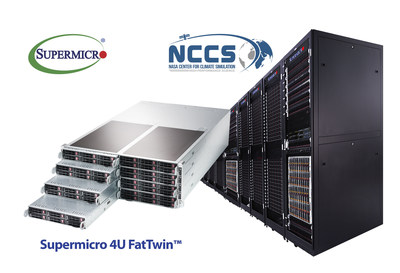NASA Selects Supermicro to Expand Advanced Computing and Data Analytics Used to Study the Earth, Solar System and Universe 2017-11-06 22:30
SAN JOSE, Calif., Nov. 6, 2017 /PRNewswire/ — Super Micro Computer, Inc. (NASDAQ: SMCI), a global leader in enterprise computing, storage, and networking solutions and green computing technology, today announced that the company has partnered with the NASA Center for Climate Simulation (NCCS) to expand advanced computing and data analytics used to study the Earth, solar system and universe. Based on the combination of density, system performance and optimized cost, the Supermicro FatTwin-based solution brings an additional 1.56 PetaFlops to NASA researchers. The Rack Scale solution is factory integrated at Supermicro’s Silicon Valley headquarters to deliver optimal reliability and efficiency.
The NCCS is part of the Computational and Information Sciences and Technology Office (CISTO) of Goddard Space Flight Center’s (GSFC) Sciences and Exploration Directorate. Its mission is to enable scientists to increase their understanding of the Earth, the solar system, and the universe by supplying a range of advanced computing and data analytics solutions. As a significant part of accomplishing this mission, the NCCS provides high-performance computing (HPC) engines, mass storage, and network solutions to meet the specialized needs of NASA’s Earth and space science user communities.
“Empowering scientists, like those at NASA, with the latest in advanced computing and data analytics solutions is a key component of Supermicro’s mission to make the world a better place not only for us but also for future generations,” said Charles Liang, President and CEO of Supermicro. “With Supermicro 3.0 we are very excited to see our investments in innovative technology advancement, expanded infrastructure and global delivery being leveraged by NASA, and we will continue to work closely with NASA, Intel and other partners like CSRA and Motivair to provide complete turn-key Rack Scale Solutions to one of the world’s most respected research agencies.”
“This is the next step in evolving NCCS supercomputing systems for hosting ultra-high-resolution weather and climate simulations in support of NASA’s mission,” said Daniel Duffy, NCCS High-Performance Computing Lead. “Such simulations work in concert with NASA satellite, airborne, and surface observations to help scientists and policymakers better understand extreme weather events, seasonal climate impacts, and long-term change.”
Within the NCCS, the Discover system is the primary HPC cluster and is comprised of individual compute units, referred to as Scalable Compute Units (SCUs). The most recent augmentation to the Discover cluster is SCU14 provided by Supermicro. The procurement for this system expansion was awarded to Edge Solutions & Consulting, Inc., headquartered in Westlake Village, California. Edge is a certified, woman-owned small business systems integrator that provides enterprise-class solutions for complex enterprise-class customers.
From a performance standpoint, this deployment brings an additional 1.56 PetaFlops to NASA on top of the existing 3.5 PetaFlops for nearly 45% improvement. Compared to the previous SCU13 augmentation, SCU14 more than doubles the performance (216%) with a smaller footprint and lower TCO.
The SCU14 solution provided by Supermicro and CSRA consists of three types of nodes: compute nodes, service nodes, and I/O nodes. The compute nodes will be used to run large parallel jobs that will communicate between all compute nodes in a given phase involving several SCUs. The service nodes will be used for a variety of purposes, including but not limited to: user logins, editing, compiling, batch submission, cron jobs, subnet managers, management nodes, etc. I/O nodes provide the conduit for moving data between a Fibre Channel SAN and the compute nodes through the high-speed interconnect fabric. Compute nodes are stateful nodes with SSDs as persistent storage.
The Supermicro turn-key Rack Scale Solution for SCU14 is based on Supermicro FatTwin™ server nodes each equipped with dual 20-core Intel® Xeon® Gold processors and Intel® SSDs for persistent storage. The FatTwin™ SuperServer® is an 8-node 4U system with each node supporting 12 DIMM slots and six front hot-swap SSDs. To provide high-speed interconnect, the cluster employs Intel® Omni-Path (OPA) 100G 48-port top-of-rack managed network switches. The Supermicro 42U racks for this fully integrated HPC cluster solution are equipped with Motivair’s ChilledDoor® Rack Cooling System to maximize the cooling efficiency for improved PUE.
“CSRA is excited to enter this new phase of supercomputing and help NASA engineer the technologies of tomorrow,” said Executive Vice President Paul Nedzbala, head of CSRA’s Health and Civil Group. “Through this procurement, NASA will have enhanced capabilities for expanding its HPC capabilities and we look forward to working with them to excel in this effort.”
“Global research leaders, like those at NASA, drive new discoveries that enrich our understanding of the universe and improve the lives of everyone,” said Trish Damkroger, Vice President of Technical Computing at Intel. “Intel’s balanced technology portfolio and close collaboration with leading system vendors like Supermicro helps put the most powerful computational tools in the hands of scientists to tackle the most difficult challenges facing society.”
“As a true pioneer of exploration and new technology, NASA continues to lead the way with the recent addition of its Discover system. Utilizing the latest technology, NASA recognized the need for a computer cooling system that would allow Discover to reach its full potential,” states Rich Whitmore, President & CEO, Motivair Corporation. “We are honored that NASA has selected Motivair’s ChilledDoor® Rack Cooling System to play such a significant role in its pursuit of technological advancements and proud to be partnered with one of our nations most revered agencies.”
